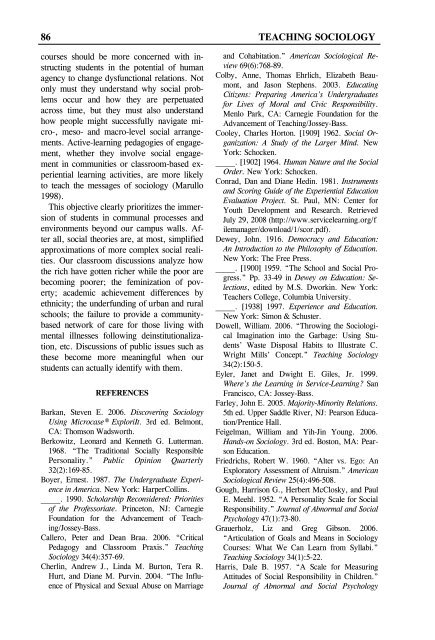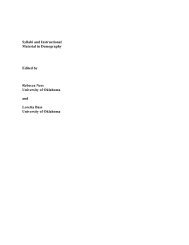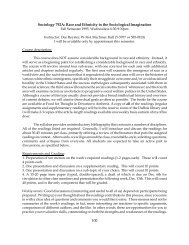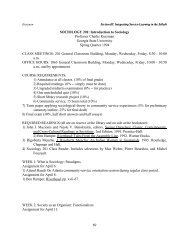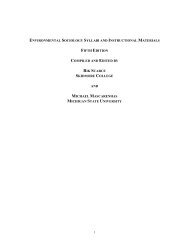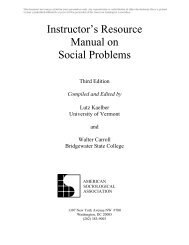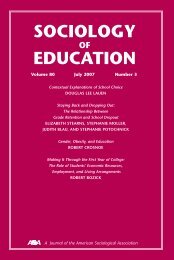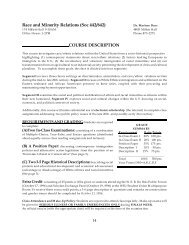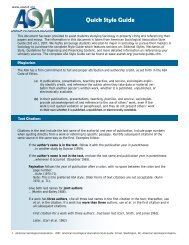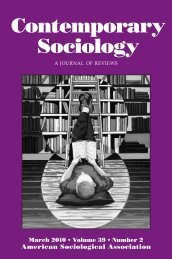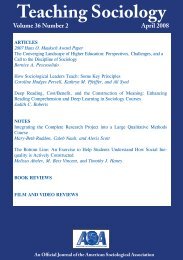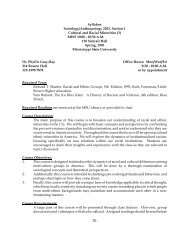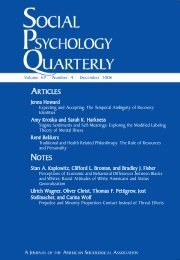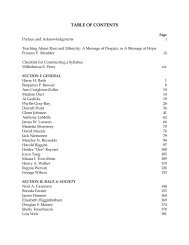Teaching Sociology - American Sociological Association
Teaching Sociology - American Sociological Association
Teaching Sociology - American Sociological Association
Create successful ePaper yourself
Turn your PDF publications into a flip-book with our unique Google optimized e-Paper software.
86 TEACHING SOCIOLOGY<br />
courses should be more concerned with instructing<br />
students in the potential of human<br />
agency to change dysfunctional relations. Not<br />
only must they understand why social problems<br />
occur and how they are perpetuated<br />
across time, but they must also understand<br />
how people might successfully navigate micro-,<br />
meso- and macro-level social arrangements.<br />
Active-learning pedagogies of engagement,<br />
whether they involve social engagement<br />
in communities or classroom-based experiential<br />
learning activities, are more likely<br />
to teach the messages of sociology (Marullo<br />
1998).<br />
This objective clearly prioritizes the immersion<br />
of students in communal processes and<br />
environments beyond our campus walls. After<br />
all, social theories are, at most, simplified<br />
approximations of more complex social realities.<br />
Our classroom discussions analyze how<br />
the rich have gotten richer while the poor are<br />
becoming poorer; the feminization of poverty;<br />
academic achievement differences by<br />
ethnicity; the underfunding of urban and rural<br />
schools; the failure to provide a communitybased<br />
network of care for those living with<br />
mental illnesses following deinstitutionalization,<br />
etc. Discussions of public issues such as<br />
these become more meaningful when our<br />
students can actually identify with them.<br />
REFERENCES<br />
Barkan, Steven E. 2006. Discovering <strong>Sociology</strong><br />
Using Microcase® ExploriIt. 3rd ed. Belmont,<br />
CA: Thomson Wadsworth.<br />
Berkowitz, Leonard and Kenneth G. Lutterman.<br />
1968. “The Traditional Socially Responsible<br />
Personality.” Public Opinion Quarterly<br />
32(2):169-85.<br />
Boyer, Ernest. 1987. The Undergraduate Experience<br />
in America. New York: HarperCollins.<br />
_____. 1990. Scholarship Reconsidered: Priorities<br />
of the Professoriate. Princeton, NJ: Carnegie<br />
Foundation for the Advancement of <strong>Teaching</strong>/Jossey-Bass.<br />
Callero, Peter and Dean Braa. 2006. “Critical<br />
Pedagogy and Classroom Praxis.” <strong>Teaching</strong><br />
<strong>Sociology</strong> 34(4):357-69.<br />
Cherlin, Andrew J., Linda M. Burton, Tera R.<br />
Hurt, and Diane M. Purvin. 2004. “The Influence<br />
of Physical and Sexual Abuse on Marriage<br />
and Cohabitation.” <strong>American</strong> <strong>Sociological</strong> Review<br />
69(6):768-89.<br />
Colby, Anne, Thomas Ehrlich, Elizabeth Beaumont,<br />
and Jason Stephens. 2003. Educating<br />
Citizens: Preparing America’s Undergraduates<br />
for Lives of Moral and Civic Responsibility.<br />
Menlo Park, CA: Carnegie Foundation for the<br />
Advancement of <strong>Teaching</strong>/Jossey-Bass.<br />
Cooley, Charles Horton. [1909] 1962. Social Organization:<br />
A Study of the Larger Mind. New<br />
York: Schocken.<br />
_____. [1902] 1964. Human Nature and the Social<br />
Order. New York: Schocken.<br />
Conrad, Dan and Diane Hedin. 1981. Instruments<br />
and Scoring Guide of the Experiential Education<br />
Evaluation Project. St. Paul, MN: Center for<br />
Youth Development and Research. Retrieved<br />
July 29, 2008 (http://www.servicelearning.org/f<br />
ilemanager/download/1/scor.pdf).<br />
Dewey, John. 1916. Democracy and Education:<br />
An Introduction to the Philosophy of Education.<br />
New York: The Free Press.<br />
_____. [1900] 1959. “The School and Social Progress.”<br />
Pp. 33-49 in Dewey on Education: Selections,<br />
edited by M.S. Dworkin. New York:<br />
Teachers College, Columbia University.<br />
_____. [1938] 1997. Experience and Education.<br />
New York: Simon & Schuster.<br />
Dowell, William. 2006. “Throwing the <strong>Sociological</strong><br />
Imagination into the Garbage: Using Students’<br />
Waste Disposal Habits to Illustrate C.<br />
Wright Mills’ Concept.” <strong>Teaching</strong> <strong>Sociology</strong><br />
34(2):150-5.<br />
Eyler, Janet and Dwight E. Giles, Jr. 1999.<br />
Where’s the Learning in Service-Learning? San<br />
Francisco, CA: Jossey-Bass.<br />
Farley, John E. 2005. Majority-Minority Relations.<br />
5th ed. Upper Saddle River, NJ: Pearson Education/Prentice<br />
Hall.<br />
Feigelman, William and Yih-Jin Young. 2006.<br />
Hands-on <strong>Sociology</strong>. 3rd ed. Boston, MA: Pearson<br />
Education.<br />
Friedrichs, Robert W. 1960. “Alter vs. Ego: An<br />
Exploratory Assessment of Altruism.” <strong>American</strong><br />
<strong>Sociological</strong> Review 25(4):496-508.<br />
Gough, Harrison G., Herbert McClosky, and Paul<br />
E. Meehl. 1952. “A Personality Scale for Social<br />
Responsibility.” Journal of Abnormal and Social<br />
Psychology 47(1):73-80.<br />
Grauerholz, Liz and Greg Gibson. 2006.<br />
“Articulation of Goals and Means in <strong>Sociology</strong><br />
Courses: What We Can Learn from Syllabi.”<br />
<strong>Teaching</strong> <strong>Sociology</strong> 34(1):5-22.<br />
Harris, Dale B. 1957. “A Scale for Measuring<br />
Attitudes of Social Responsibility in Children.”<br />
Journal of Abnormal and Social Psychology


